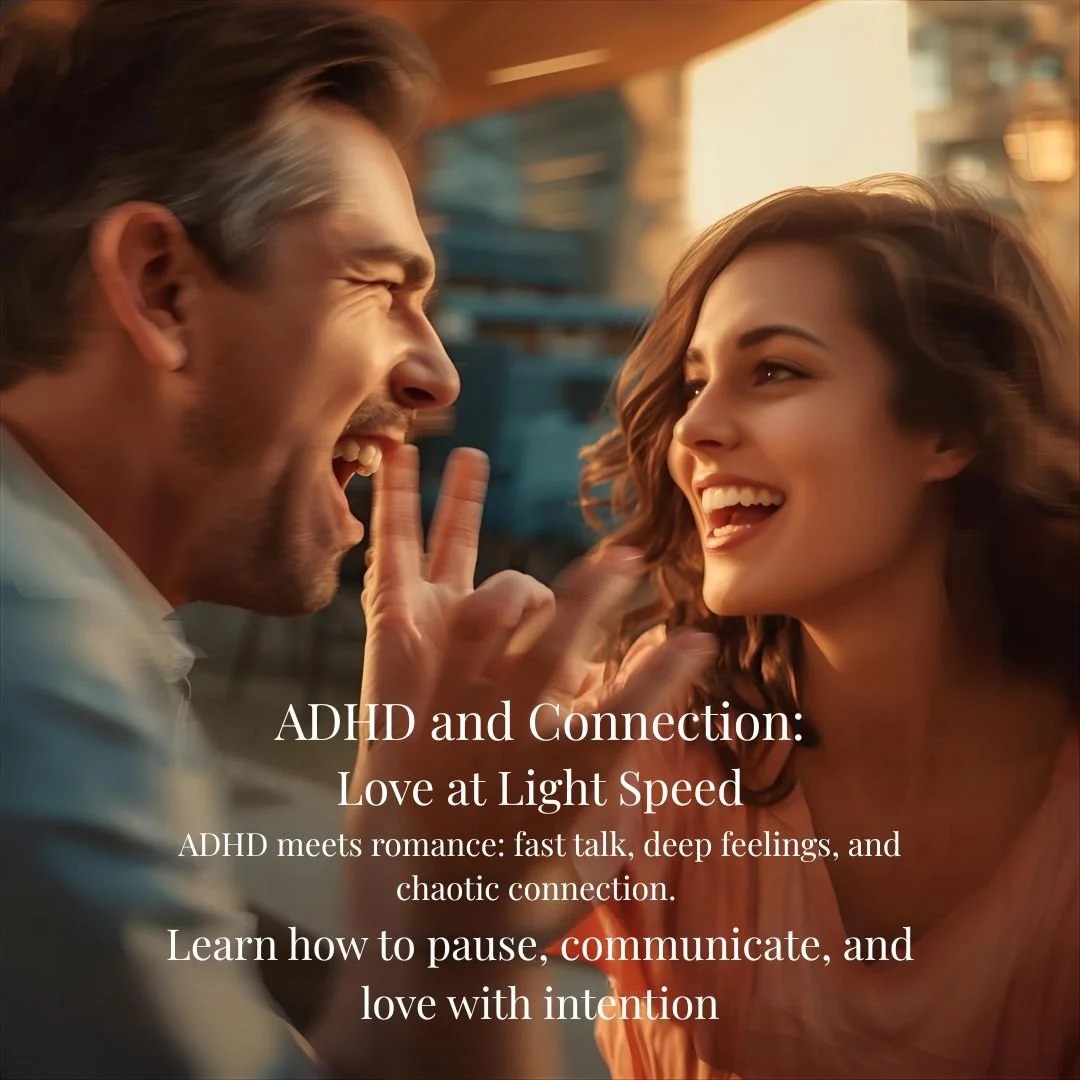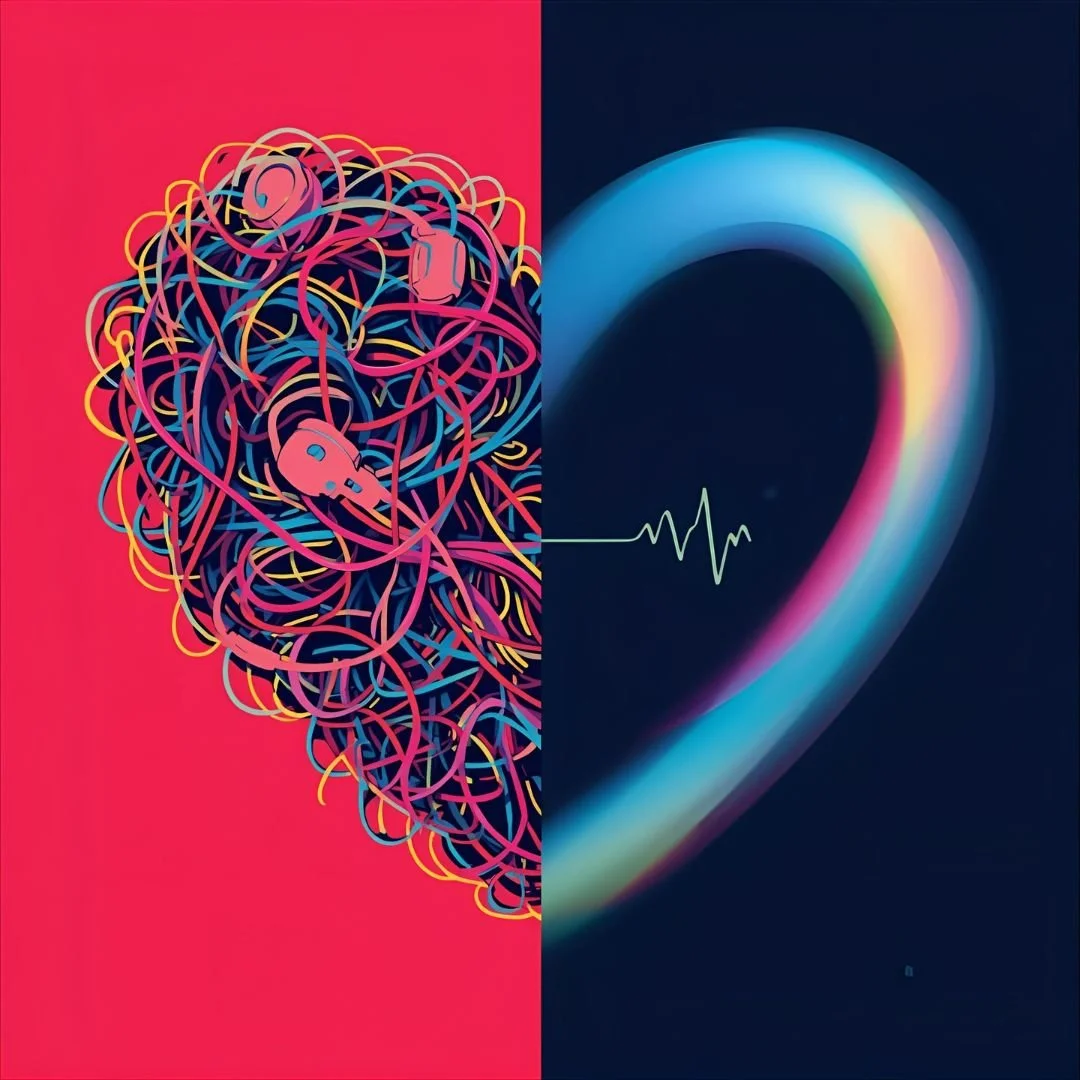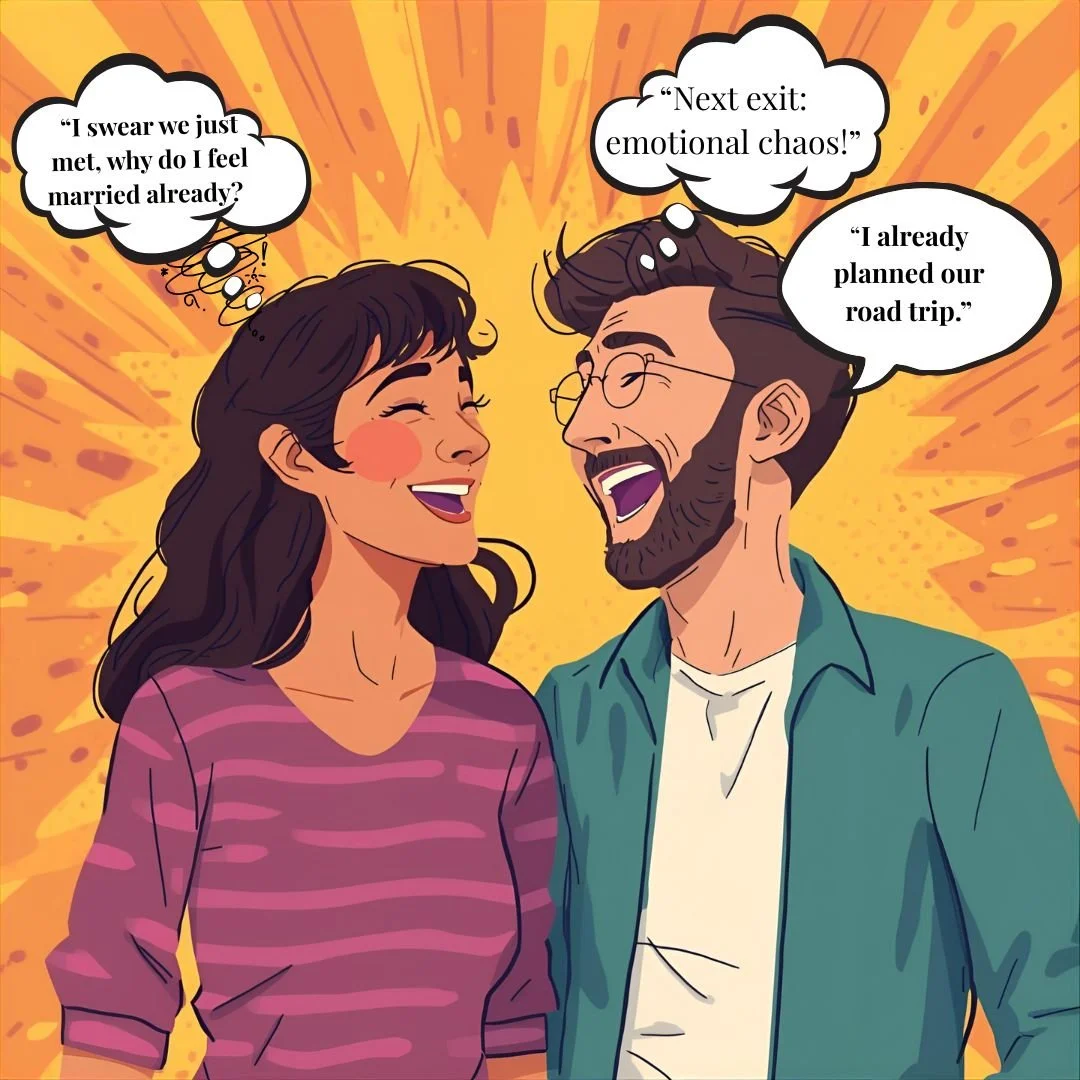ADHD and Connection
Talking Fast, Feeling Deep, and Getting Lost in Translation
If last week’s post was about control and compulsion, this one’s about connection and chaos.
Because when you mix ADHD with romance, it’s not love at first sight — it’s love at light speed. You’re fully present, all in, heart first, logic later. But once the dopamine fades, you find yourself wondering:
When your heart races faster than your filter, connection gets complicated. ADHD can turn love into a high-speed adventure — equal parts laughter, chaos, and late-night overthinking. Discover how to turn emotional intensity into empathy and find humor in the pauses that make love real.
Did I overshare?
Did I interrupt again?
Did I just propose a road trip after three dates?
ADHD doesn’t just mess with focus; it plays percussion in your love life. We love fast, talk faster, and then second-guess everything at 3 a.m. while color-coding our regrets (and our sock drawers).
When Control Met Chaos: The ADHD/OCD Duet
Last week in OCD in Love, I admitted I used to manage romance like a spreadsheet — analyzing every text, timing every reply, and treating vulnerability like a quarterly audit.
ADHD, however, refuses to sit still for that meeting. It doesn’t over-control connection — it short-circuits it.
With OCD, my brain whispers: “Don’t mess this up.”
With ADHD, it yells: “Say it now before you forget it!”
Both mean well. Together, they form a power ballad of chaos — one chasing perfection, the other chasing dopamine. Somewhere between the verses, genuine intimacy tries to sing along.
How ADHD Shapes Connection and Communication
Let’s unpack what’s happening beneath the emotional noise — neurologically and behaviorally.
Emotional Hyperfocus
When someone catches your interest, you zoom in like a laser. Neuroscientists call it hyperfocus — a dopamine-charged state where time and context vanish [1]. It feels electric … until it doesn’t. When novelty dips, your attention crashes, and your partner’s left wondering why the spotlight went dark [2].
Impulsive Expression
ADHD doesn’t do filters. You’ll blurt the first thought that sparks joy — or chaos. Oversharing trauma at brunch? Interrupting mid-story with “That reminds me …” before realizing you hijacked the plot? Been there. It’s not selfishness; it’s dopamine chasing novelty [4].
The Dopamine Rollercoaster
Love, especially new love, is like an all-day ride pass. Once the thrill plateaus, motivation drops, and you mistake that chemical comedown for emotional drift [3]. Spoiler: it’s not heartbreak — it’s neurochemistry asking for a snack.
Sensory Sensitivity
Crowded restaurants, strong scents, shifting tones — your brain’s an open mic for sensory input. What feels like rejection might just be overstimulation [5]. It’s not that your partner sighed wrong; it’s that your nervous system took it personally.
My 1½-Year Love Cycle (And the Comedy of Patterns)
Even before I had the acronyms (ADHD, OCD — collect them all!), I noticed a pattern: my relationships had a shelf life.
“Growing up — and honestly, even now — I struggled to approach a girl and ask for a date. Most of my relationships started because my twin sister introduced me. Once I did form relationships, they lasted about a year and a half. It became a running joke in high school and college: my 18-month expiration date.
The first year was magic — adventures, wit, grand plans. Then as things got real, my humor amped up to deflection levels. It was like I was testing if they’d still like me once I turned the volume to eleven.”
Now I see it clearly: ADHD craved novelty; OCD craved control. Together, they made love feel like a three-legged race between fear, excitement, and overthinking — and sometimes we all face-planted at the finish line.
What Psychologists Say: Building Connection That Lasts
Experts offer some grounded strategies to channel that neural energy into something that actually resembles emotional stability — without killing the spark.
Slow the Conversation, Not the Passion
ADHD brains move fast. The goal isn’t slowing the heart; it’s pacing the words. Therapists recommend the Three-Second Rule: pause three seconds before responding in emotional conversations [6]. Those three seconds are relationship CPR.
Create Cue Systems
Use gentle signals with your partner — a touch on the arm for interruptions, a shared word (“reset”) when things escalate [3]. It’s communication with training wheels — adorable and surprisingly effective.
Externalize Memory and Emotion
Shared calendars, journals, voice memos — whatever keeps your love life from being run by your forgetful prefrontal cortex. Write it down before your brain files it under “miscellaneous panic.”
Therapy & Coaching
ADHD-informed couples therapy is not about fixing you; it’s about giving structure to the chaos so love doesn’t need a project manager. There’s freedom in understanding how your brain works — and how it loves.
Summary — Turning Intensity into Empathy
Connection, like attention, is fleeting unless we nurture it with intention. ADHD doesn’t make us bad partners — it makes us intense ones. We love loudly, think quickly, and sometimes crash spectacularly.
But understanding how our brains process emotion, novelty, and rejection lets us turn that same intensity into empathy. Love becomes less about performance and more about presence — messy, funny, beautiful presence.
💬 The Pause and Play Challenge
For the next three days, try this experiment in mindful connection:
1.When you feel the urge to jump into someone’s sentence, pause for three seconds.
2.Notice what happens — in them, in you, in the silence.
3.Journal about one moment where that pause changed the outcome (or made it hilariously awkward).
No pressure — just a tiny act of emotional defiance. You might surprise yourself. And if you do, share it in the comments — because let’s be honest, there’s no better bond than collectively oversharing our ADHD misfires.
Sources & Further Reading
1.Barkley, R. A. ADHD and the Nature of Self-Control. Guilford Press, 2022.
2.National Institute of Mental Health. “Attention-Deficit/Hyperactivity Disorder.” NIMH.gov (2024).
3.CHADD. “Relationships and ADHD.” CHADD.org (2023).
4.Psychology Today. “ADHD Basics.” PsychologyToday.com (2023).
5.ADDitude Magazine. “ADHD in Relationships: Tips and Strategies.” AdditudeMag.com (2024).
6.Cleveland Clinic. “Adult ADHD.” ClevelandClinic.org (2024).
Recommended Reads:
Melissa Orlov — The ADHD Effect on Marriage
Edward Hallowell & John Ratey — Driven to Distraction
Relationship Survival Snack
Today’s emotional snack: Three seconds of silence — low calorie, high impact. Sprinkle it liberally between sentences and serve with eye contact. Pairs beautifully with forgiveness and a dash of humor.



